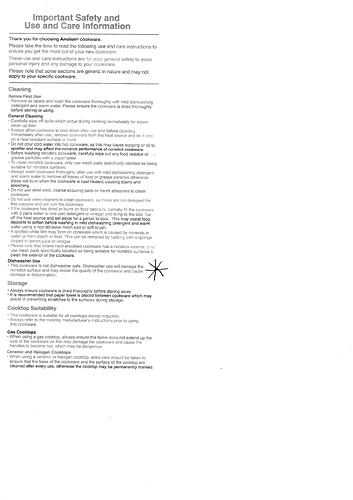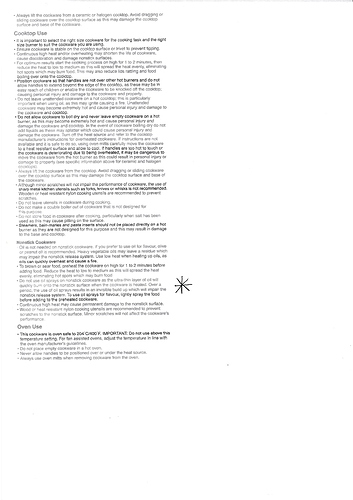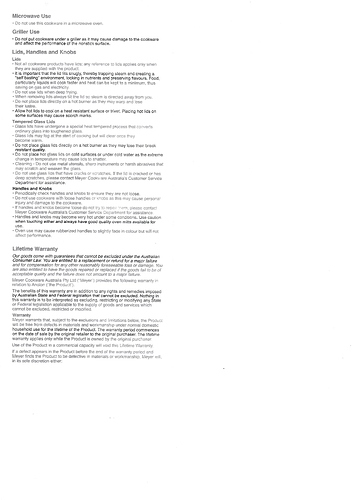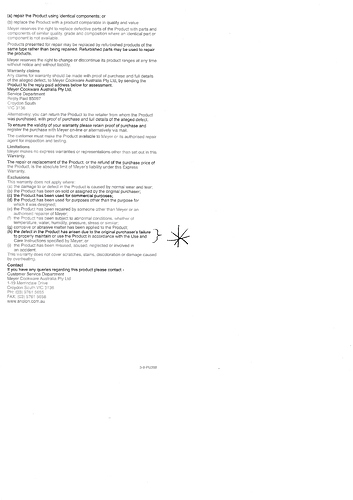I’ve bought fry pans and have been told NOT to use olive oil in them, instead to use grape-seed oil. I can’t remember why olive oil was not suitable, maybe somebody has an explanation?
We had the same advice from one of the cookware specialty shops when purchasing a non stick coated pan.
I initially took it to be a way to avoid warranty as olive oil is one of the regular oils used in Mediterranean cooking!
It was suggested by the store staff that the olive oil if over heated produces a burnt residue that sticks to the non stick pan and cannot be removed. Why this is unique to olive oil, and not other plant based oils makes little sense.
Stainless steel and cast iron cookware all requires oil and seasoning. We were directed to use canola oil on bare cast iron as it was less acid than other fats or oils. No answers here, just more questions?
I have been told the same. This seems to be passed around the kitchen shops, I can’t think why either.
The WWW tells us variously that OO polymerizes more than other oils when heated and so it is unsuitable but also that it is better than other oils. Whether any of these claims are backed by hard evidence I cannot determine. In theory more unsaturated oils might form a sticky residue due to breakdown more than others but I see no empirical data that this is important.
Maybe an allied thread about pans is needed? On that topic a properly seasoned and maintained cast iron skillet is more stick free than any stick free pan on the market. Heavy and not as friendly in many ways, but they also can impart flavours to kill for, not just die for.
Good idea and also about whether non-stick needs oil for frying. Our first (expensive) non-stick pan we didn’t use oil when frying all that often and the pan lasted about 2 years before losing its non-stick qualities. It eventually became difficult to cook on as food was sticking and hard to remove when washing.
We then bought a heavy (cheap) based non-stick pan and used oil (after being told that using oil prolongs the life of non-stick). This pan is about 5 years old and still works well…albeit not as non-stick as new but still good.
We have a 12" Anolon Advanced non-stick fry pan which must be at least 15 years old and is still in perfect condition.
I use it regularly to cook bacon and eggs for breakfast and I always coat the inside with olive oil, and always clean it with our Dishmatic cleaner.
A top quality product properly looked after.

We have a number of brands of non-stick pans, and the instructions vary. The most common is to wipe them with a light coating of ‘oil’, then wipe them clean, prior to storing them for next use. Some have no mention of oil, and some have warnings not to use spray on oils as they make such a thin oil layer they bake on and cannot be removed.
I struggle to understand how there would be a significant difference between wiping oil and the spray, but the small difference must matter.
One hint I picked up after many years is to lightly oil the food, not the non-stick fry pan, for maximum non-stick life.
Anolon specifically states that the use of oil sprays will damage their pans and will void the warranty as they also do regarding cleaning them in dishwashers.
This is what Anolon states for product care:
Follow these 7 simple steps to avoid some of the common ways your non-stick pan can be damaged:
- Avoid using continuous high heat and/or overheating the pan as this can cause discolouration and permanently damage your non-stick surface.
- Do not use steel wool, coarse scouring pads or harsh abrasives to clean cookware.
- Do not store food in cookware after cooking, particularly when salt has been used as this may cause pitting on the surface. Do not leave utensils in cookware during cooking.
- Do not use oil sprays on nonstick cookware as the ultra-thin layer of oil will quickly burn onto the nonstick surface when the cookware is heated. To use oil sprays for flavour, lightly spray the food before adding to the preheated cookware.
- Although minor scratches will not impair the performance of nonstick cookware, the use of sharp metal kitchen utensils such as forks, knives or whisks is not recommended.
- Do not allow cookware to boil dry and never leave empty cookware on a hot burner.
- Do not use oven cleaners to clean cookware, as these are not designed for this purpose and will ruin the cookware.
I can’t see where it says that warranty (see link towards the bottom of the page after selecting Product Issue/Warranty and then Cookware and Roasters) will be specifically voided by using a spray oil…but it appears that the thin coating of oil from a spray can can burn on the surface…but they do suggest if one wishes to use sray oil to coat the food before adding to the preheated non-stick cookware. It however says that under warrsnty exclusions products not cared for in accordance with care instructions provided by Anolon.
So one can use spray oil provided it is not used directly on the cookware surface. I don’t know how they would be able to tell if spray oil has been used in such a way unless the customer donfirms this in the event of a warranty claim.notwithstanding this, if one wants a non-atick cookwate long life, not using spray oil appears to be a good idea.
I don’t use spray oil in the kitchen as I dind it tends to have a lot of over spray/drift which coats the surrounding area. I however use canola spray oil in the BBQ which is located outside.
This applies to any pan, particularly if you want to seal a crust on high heat (as on steak) oil the meat. It is the meat that needs to be protected and lubricated.
A scan of the document which was included with one of our Anolon Advanced pans is below.
Whilst I clearly remember a much more direct warning way back when we bought them at least 15 years ago, the care instructions are clear enough.
For some reason oils have become one of those highly contested subjects where people have adamant views without much factual backup. But my understanding is that grape seed oil has a much higher smoke point than olive oil. Olive oil is great for cold dressings, but for cooking, it’s grape seed oil. Trying to find scientific evidence of this through a google search will however see you wading through guff about coconut oil etc
It seems the smoke point isn’t the main consideration, it’s oxidation and the formation of aldehydes. For an easily understood explanation of an experiment on this, see: https://www.bbc.co.uk/programmes/articles/3t902pqt3C7nGN99hVRFc1y/which-oils-are-best-to-cook-with
The experimenters concluded olive oil was the best compromise.
It’s because oil olive has a very low smoke point which means it burns at much lower temperatures than other oils like grapeseed, bran, canola and coconut. If you cook on high heat olive oil is the worst one to use.
The nonstick surfaces of today, are much more durable than those even of 5 years ago. I have some el cheapo Aldi pans, bought fairly recently, and they are the best non stick pans I have had in years. Others in the past would deteriorate fairly quickly (say within a year) but these are so good so far, I expect them to last a good long time.
Back in the last century!
The earliest TV promotions for non-stick cookware featured cooking eggs etc without any oil or fats!
That was one of the healthy selling points of the pans.
Is my recollection correct?
If so why are we now discussing the use of which oils to use in non-stick cookware?
Perhaps we can also discuss how to cook without oils and fats in non-stick cookware, and the industry con of having us use oil and fats which lead to the demise of our non-stick cookware. Hence we buy even more non-stick cookware in the hope the next brand will not fail too.
Does anyone use non-stick “Au naturel”?
I cook my porridge in a non stick saucepan, no oil or fat and it wipes out clean with ease. It is a decades old pot and has never seen oils or fats!
There appears to be a sound argument for using cast iron or food grade SS cookware etc and ditching the teflon when frying.
I would love to be able to use cast iron. Alas, I cannot lift any of them because I have no strength in my hands anymore. Had a cast iron frypan some years ago, had to let it go.
On the matter of using nonstick naked? Yep, been doing that with the last 3 acquisitions. Sometimes I add a little butter to the chicken, because I like the taste. Eggs, steak etc, no oils.
Whilst both our Analon Advanced and our bluestone frying pans will cook without any oil or butter, and will clean easily, we find that things such as bacon and sliced onions cook better with a little olive oil coating the pan
I appreciate the feedback. I see light weight non-stick aluminium cookware as well as CI/SS as equal weapons of mass destruction of good food and cooking. I understand totally the usefulness of and need for lower weight cookware for many of us.
While Choice has some guidance on the use of nonstick cooking ware, I eagerly wait for the Choice lab teams designed non-stick cookware bake off and flame torture test, @BrendanMays to see who’s products are most durable while resisting the inevitable. Every home cook and masterchef contestant sooner or latter gets distracted. Forgets to put the cumin in the curry, or sets fire to the kitchen or overheats the pan.
I wonder just how tolerant modern non-stick cookware really is, and is there a best buy recommendation? The specialty shops are littered with expensive chefy named high cost pots and pans sporting all manner of different magic non-stick coatings.
I paid good money for a set of Baccarat Rock non stick cookware a couple of years ago because it was reccomended by the store and came with a “lifetime warranty”. Took them back to the shop last year as 4 of the 6 pans were sticking badly. I’m a conscientious and careful cook so was confident I had followed the instructions. The store, House, refused to replace them on the grounds that I had used extra virgin olive oil on them. I checked the instructions which I had kept; no mention of EVOO. I returned them to Baccarat and spent months negotiating until they finally refunded the cost. An extremely frustrating process and I won’t be buying Baccarat again, nor shopping at House. I’ve gone back to stainless steel, with a cheap non stick pan that I use only when necessary.



